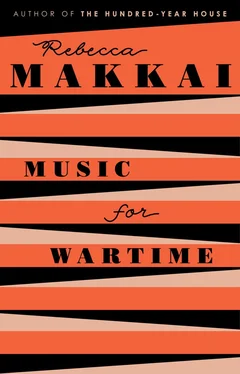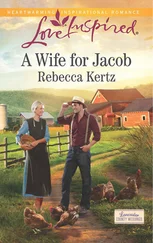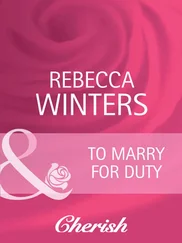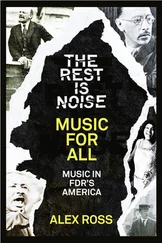Was this what they did, then, every night? This couple that should not have been a couple, this inexplicable by-product of the twentieth century’s worst moment? They gazed at each other and sang Irish love songs? Melanie pictured snifters of brandy. László’s clouded eyes, emanating a love that couldn’t really have been any different than any other human love in history, could it? There were seven billion love stories on the planet, but when you cracked them open, if you ever cracked them open, didn’t they all have the same unoriginal love at their core? She wanted to ask. She wanted to demand an explanation.
But the door was closed, and so she could not see and she could not ask. She walked down the steps and onto the street, and the song continued.
She bade me take love easy, as the leaves grow on the tree
But I was young and foolish and with her did not agree.
Both of them were singing now. Dear God, what was that? What was she meant to do with that ? Both of them were singing.
Appearances, as always, are deceiving. This book, appearing a year after my last novel, is in fact the product of thirteen years’ labor; the oldest words in here were written in June 2002. To look at my own table of contents is to see those thirteen years — and the people who carried me through them — in glorious Hollywood-style montage. (My first snail-mail rejection letters, the monolithic Dell I used to write on, Harkness tables full of sharp workshoppers, kind editors, two babies who aren’t babies anymore, mountains of drafts, utter despair and brave students and artists’ colonies and friends who toast survival.) My entire career — my entire adulthood — has happened in this collection.
Infinite thanks to Kathryn Court and Lindsey Schwoeri, my brilliant and patient editors; Holly Watson, Angela Messina, and Carolyn Coleburn; Emily Hartley; Lynn Buckley; Veronica Windholz; and all the scouts and book reps and other footsoldiers. If I could afford to, I’d send flowers every day to Nicole Aragi, the best agent who ever agented, and Duvall Osteen, the best assistant who ever assisted.
Almost all of these stories had their first homes in literary journals. It was 2003 when David Hamilton of The Iowa Review sent me my first acceptance letter, but the fact that he wrote it in purple fountain pen helps my feeling that this happened centuries ago. A decade later, Harry Stecopoulos, now at the Iowa helm, published “The Museum of the Dearly Departed” and edited it with a sharp eye. R. T. Smith at Shenandoah not only published “The Worst You Ever Feel” but gave me a job back in college and an introduction to the literary journal landscape. Rob Spillman edited “Peter Torrelli” for Tin House under extraordinary circumstances, for which he deserves some kind of plaque. Boundless thanks as well to Emily Stokes and the very patient fact-checker Jacob Gross at Harper’s ; Stephen Donadio and Carolyn Kuebler at New England Review ; Ladette Randolph and guest editor Tony Hoagland at Ploughshares ; Phong Ngyuen at Pleiades ; Sascha Feinstein at Brilliant Corners ; Garrett Doherty and Anthony Varallo at Crazyhorse ; Jonathan Freedman at Michigan Quarterly Review ; and Jordan Bass at McSweeney’s.
One night in March 2008, while my first baby slept in a basket on the floor (at a time when I couldn’t imagine ever being able to prioritize writing again), Heidi Pitlor of The Best American Short Stories sent me the single best e-mail of my life. Neither this collection nor my career would look the same without her support then and over the following years.
Salman Rushdie, Alice Munro, Richard Russo, Geraldine Brooks, Dave Eggers, and Kevin Brockmeier kindly chose stories included in this collection for anthologies. I’m still geeking out about this.
These stories have benefited from innumerable readers and volunteer editors over the years. Notable among them: Rachel DeWoskin, Gina Frangello, Dika Lam, Emily Gray Tedrowe, and Zoe Zolbrod gave me invaluable edits on “The Miracle Years of Little Fork” and “Good Saint Anthony Come Around” as well as writerly friendship as this book came together. A lifetime ago, David Huddle encouraged early drafts of “Suspension,” “Acolyte,” and “The Worst You Ever Feel.” He also made me, in a thousand ways, a better writer. Julie Snyder, Ben Calhoun, and Sarah Koenig at This American Life put a dent in my bucket list by letting me read “The November Story” on air — but more important, Julie Snyder’s edits helped improved the story tremendously. Years ago, before this book looked anything like it does now, someone got me a well-intentioned but premature introduction at Chronicle Books. They wisely turned down what was an inchoate collection, but an editor there named Brianna Smith took the time to write me back and suggest that the stories might eventually coalesce around some of the themes she’d noticed — notably, music or war. Oh.
Some further debts: The violinist Kathleen Thomson kindly read both “The Worst You Ever Feel” and “Cross” for musical accuracy; remaining mistakes are mine. A childhood friend, Elizabeth Pulbratek Randisi, went and grew up into an estate planning lawyer and gamely helped me figure out the inheritance details in “The Museum of the Dearly Departed.” Any lingering plausibility issues are no reflection of her excellent legal skill. Alex Ross’s 2009 New Yorker article “The Music Mountain” launched my obsession with the Marlboro Music School and Festival, and allowed me to imagine the place that would hover in the background of “Cross.” At a dinner one night, Brian Bouldrey told me a story about the composer István Márta; I went back to my hotel room and wrote “The Singing Women.”
This book would not exist yet if it weren’t for the Corporation of Yaddo, the Ragdale Foundation, the Ucross Foundation, and the National Endowment for the Arts.
I was blessed to be born into a strange and artistic family, one that I’m still struggling, in many ways, to understand. But I was handed more stories than I could ever decipher or use, and — more important — I was instilled from the beginning with the understanding that the arts were, while perhaps not the best way to make a living, the best way to make a life.
Jon Freeman is now married to a busy writer but used to be married to someone with delusions of being a writer. I’m not sure whether my neuroses were greater now or then, but he’s put up with all of them and edited the hell out of every story here. This book is for him.












